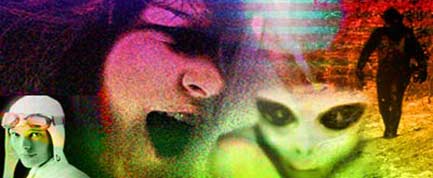Fringe Science and the Secretive Project Stargate

One of the most anticipated television shows of the fall season is "Fringe," from J.J. Abrams, the hitmaker behind "Alias" and "Lost."
The Fox series, whose pilot aired Sept. 9, has been described as a blend of "The X-Files," "CSI" and the "Twilight Zone," with a bit of filmmaker David Cronenberg's dark humor. Joshua Jackson plays Peter Bishop, a troubled young man who joins his genius (and possibly quite insane) scientist father and a hot young FBI agent to investigate paranormal phenomena, most involving conspiracies and national security issues.
The titular "fringe" comes from "fringe science," the study of which apparently drove the elder Bishop into an insane asylum for nearly two decades. But what is fringe science?
Fringe science
Fringe science typically includes paranormal topics with an assumed or alleged connection to science, such as mind control, ESP (or its newer term, remote viewing), ghosts, and so on.
Then there are the ever-popular "free energy" machines, versions of which date back at least a century. Their designers claim that the devices can produce more power than they consume and run forever, though conspiracy theorists say that the technology has been suppressed by the world's oil and gas companies. (They don't explain why the energy companies wouldn't simply adopt the "free energy" technology themselves, instead of ignoring it in favor of expensive and risky drilling.)
Researchers into fringe science topics typically paint themselves as mavericks, independent rebels brave enough to thumb their nose at the scientific establishment. Others point to a secret U.S. Government project named "Stargate" as proof that fringe science is valid.
Sign up for the Live Science daily newsletter now
Get the world’s most fascinating discoveries delivered straight to your inbox.
Project Stargate
From the 1970s through the mid-1990s, there was indeed a fringe science government project designed to explore the possibility of psychic powers.
During the Cold War, rumors leaked from behind the Iron Curtain that the Russians were developing an army of super-psychic spies. Nervous U.S. military brass wanted to know if this was true, and if so, were we winning the Arms Race but losing the Psychic Race?
Thus Project Stargate was born, testing "remote viewers" and their claims to gather military intelligence supernaturally. The research went on for about two decades, with little apparent success.
Finally the CIA took over the program and asked scientists to review the results. They concluded that the psychics did no better than chance, and that the data indicated that psychic information was neither validated nor useful. Project Stargate was soon shut down.
Reality check
The idea that there must be some validity to the project otherwise it would not have been funded or renewed is laughable.
There are hundreds or thousands of federal projects that have been funded despite never having been proven valid or effective, including the Star Wars program, abstinence-only sex education, and the DARE program. (Some claim that the Pentagon still has a secret team of psychics on staff, though if that's true, their glaring failure to find Osama bin Laden seven years after his terrorist attack speaks volumes.)
In the final analysis, there really is no such thing as "fringe science." There is good science, there is bad science, and there is pseudoscience, but the scientific investigation of the physical world has no fringes, no edges.
If "fringe" topics like psychic power, ghosts, and free energy really exist — despite a lack of hard evidence — then they are hardly "fringe" at all; instead they will be incorporated into mainstream science as soon as their proponents provide evidence to back up their claims.
Benjamin Radford is managing editor of the Skeptical Inquirer science magazine. He wrote about the media and pop culture in his book" Media Mythmakers: How Journalists, Activists, and Advertisers Mislead Us." His books, films, and other projects can be found on his website.











